Even as urban Indians struggle to recover from the demonetisation blow, mid-day’s field visit reveals rural areas are far worse off. No cash in their hands means no food in their mouths either
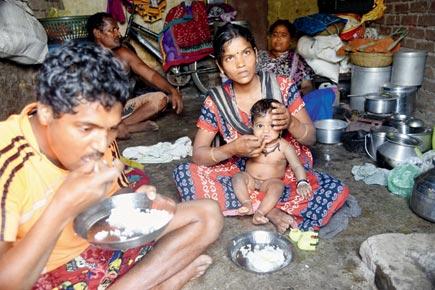
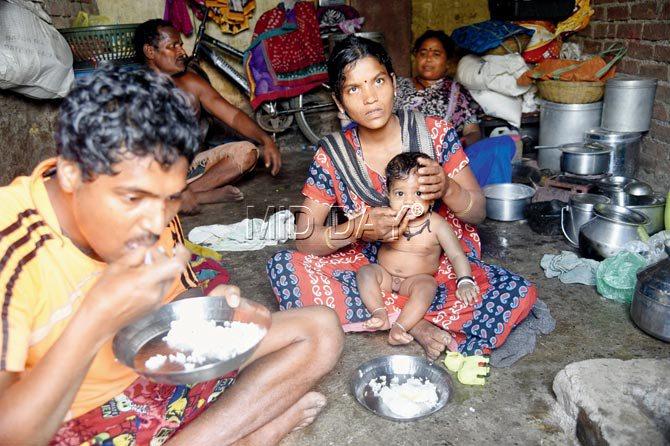
Parshuram Chavan’s family, including his infant son, has eaten nothing but plain boiled rice for over a week, since shops no longer accept their money. Pics/Sameer Markande
Nobody has been hit harder by the cash crunch than those living hand to mouth. No cash in their hands means no food in their mouths either. “I have nothing to feed my eight-month-old son except for plain boiled rice. I have money, but no shopkeeper is willing to accept it,” said Parshuram Chavan, a resident of Dohole village, about 75 km from Mumbai.
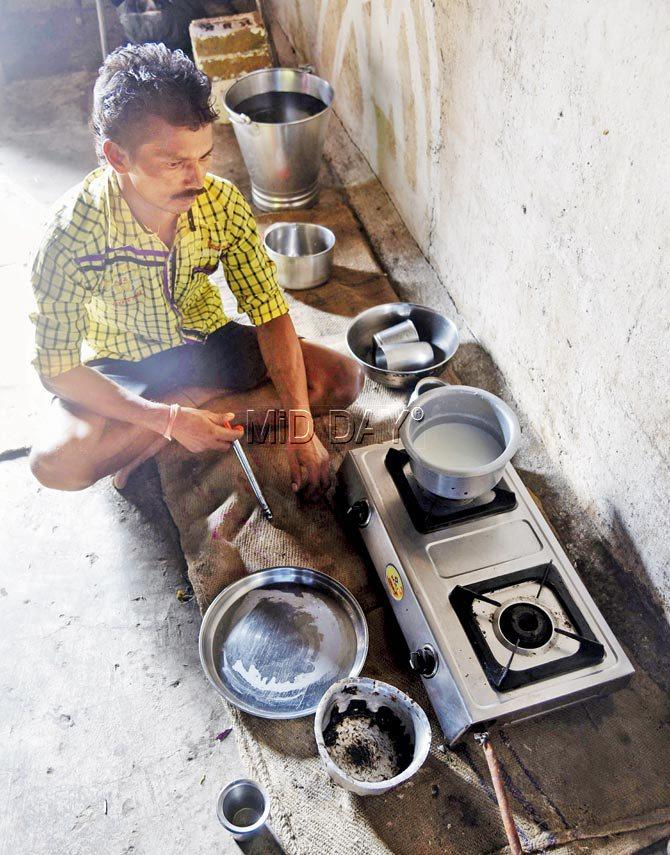
Indu Bhagel stares at his near empty utensils, certain that he will have to sleep on an empty stomach
It’s not like the family doesn’t have money. Parshuram and his father both have jobs at the local dairy farm, where they earn a respectable Rs 10,000 each. But his mother, Sheela (50) can barely control her tears as she holds up several notes of Rs 500. “What do I do with this money that nobody wants? I walked 7 km to the market in Padgha and took Rs 2,000 with me to buy food, but none of the shopkeepers were willing to accept my money. Some of them were willing to sell me some food, but said they had no change to return,” she recalled.
Also Read: Demonetisation: Woman has miscarriage as Bihar clinic declines old notes
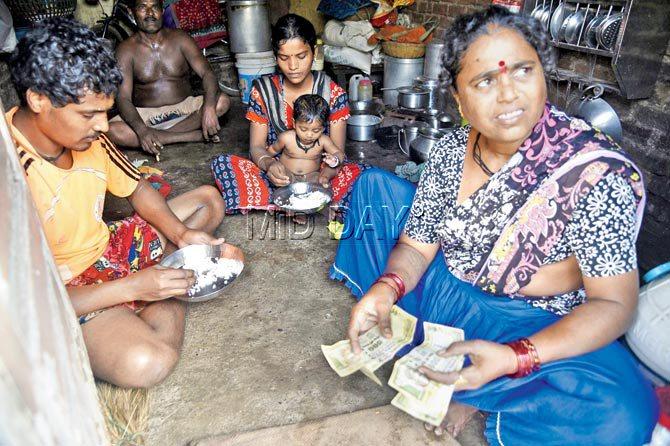
Sheela Chavan (right) is not sure what her family will eat once they run out of rice in a couple of days
For the past week, the family of five have survived on nothing but plain boiled rice, as they haven’t been able to buy pulses or vegetables ever since the Rs 500 and Rs 1,000 notes were demonetised on November 8. Sheela has no way to buy baby food for her infant grandson Mahesh, all of 8 months old, so they’re feeding him rice too.
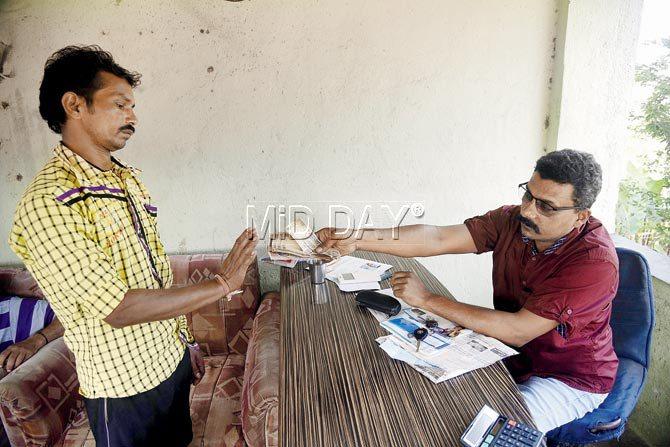 “Main kya karu is paise ka, joh kohi nahin leta?” says Indu Bhagel, as refuses to take money from his boss
“Main kya karu is paise ka, joh kohi nahin leta?” says Indu Bhagel, as refuses to take money from his boss
“I had just Rs 50 in change, and managed to buy 2 kg rice with that. But even that is almost over now. I don’t know what we will eat two days later,” said the matriarch of the Chavan family.
Whom can we bank on?
To those who ask why these villagers do not deposit their money or get it exchanged at the bank, the Chavan family said: “We hail from Solapur and do not have any bank account. If we go to the bank to exchange the currency, we will have to wait in long queues for hours and by the time our turn comes, there may not be any money left in the bank. Also, if we stand in queues, who will go to work? Our salary will get deducted if we skip work and the buffaloes we take care of will also suffer, as they need to be cared for just like children.”
Empty utensils
The story is much the same across Dohole village, a tribal hamlet just 75 km from Mumbai. The village economy depends on the small local dairy units, where most of the residents are employed as casual labour. One such worker is Indu Bhagel (35), who had not a grain to eat all day yesterday. He went to work on an empty stomach so he would at least get his daily allowance of half a litre of milk from his employer.
“I finished the last of my stock of rice on Tuesday night. Now no shopkeeper is willing to sell rice to me because I only have Rs 500. I haven’t eaten anything since morning, and am looking forward to the half-litre of milk. It is not enough, but at least it’s something,” said Indu, as he stared woefully at his empty utensils.
The local business owners are doing their best to support their employers, but even their hands are tied. Indu’s boss John Kokkat offered an advance on his salary, but he had only the old currency to give.
“Main kya karu is paise ka, joh kohi nahin leta? (What do I do with this money, which no one is accepting?)” said Indu, as he refused the advance.
Read Story: Post demonetisation, donation boxes at Mumbai hospitals flooded with Rs 500 and Rs 1,000 notes
His employer John expressed his helplessness: “I have just a few Rs 500 and Rs 1,000 notes with me. We deal on credit basis, and the market owes me Rs 7 lakh, but traders are only willing to pay me in the old currency. What can I do with that? I am not even able to meet my day-to-day business expenses, nor I am able to pay wages to the 15 people working at my dairy unit.”
John added that while he appreciated Prime Minister Modi’s move to curb black money, he also believed that the government should have put more thought into how it would impact the common man. “The people who worked with the prime minister on the plan, should have done better home work. Traders like us, and daily wage earners, are bearing the brunt of the decision. We have no money for our daily expenses, and our entire business has been affected badly.”
Banking system down
Most of the ATMs in the Padgha district, including those belonging to nationalised banks, had no money and the shutters were down. Rajaram Thackeray, from Kalamboli village, said, “Some bank employees in Padgha were initially giving change for Rs 1,000 in return for a commission of Rs 200. When locals complained, the matter reached some senior officials and now all cooperative banks have been advised not to take any deposits from public; we are only allowed to make withdrawals.”
The manager of the Thane District Cooperative Bank’s Padgha branch, SL Ghaywat confirmed that they have stopped accepting deposits from public, claiming they were merely following instructions from the Reserve Bank of India (RBI).
“We are getting only Rs 2000 currency notes from our headquarters for disbursement. We have not got lower denominations so far. Our requirement of cash is Rs 1 crore but we are getting only Rs 25 lakh, which we somehow disburse to all our customers who stand in queue. With no deposits coming to the bank, and only cash being withdrawn, the banking system will surely be impacted, unless this matter is sorted out soon,” he added.
GP Parsik bank’s branch manager, Shantaram Takane, also confirmed the severe cash crunch.
“We have 12,000 customers, but we get only Rs 3 lakh to disburse to the hundreds of people standing in line. It is just not possible to serve everybody.”
A customer at the bank complained that bank staffers were behaving rudely with them. “We have deposits with this bank and some of us have availed of home loans from here, but still the staff behave as if they are doing us a favour by giving us our own money.”
 Subscribe today by clicking the link and stay updated with the latest news!" Click here!
Subscribe today by clicking the link and stay updated with the latest news!" Click here!







